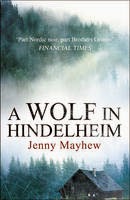Thursday, 13 February 2014
A Wolf in Hindelheim
This is a deeply
claustrophobic novel, set wonderfully in a bleak and backward 1920s
rural Germany that feels far more as though it belongs to a medieval
rather than twentieth century world. Hindelheim is a typical remote
village, where outsiders are viewed with suspicion and where unhappy
marriages and petty squabbles abound. Set against this backdrop of small
minded rivalries a baby disappears. Suspicions rest upon the Jewish
shopkeeper, a young man who moves through life with easy grace, and who
has never made any real attempts to fit into his community. Constable
Theodore Hildebrandt, as usual refuses to accept the pervading view of
the situation, at least not without any evidence. His suspicions about
what actually happened at the house of Dr Koenig are clouded by his
feelings towards the Dr's young wife. This is a taut and well written
novel that pulls together threads related to the dangers of rural
small-mindedness, an underlying anti-Semitism, the rise of the 'science'
of eugenics, and the growth of proto-Nazi groups within Weimar Germany.
The concluding chapter leaves us in little doubt about the potential
fate that awaits one central character while leaving the fate of the
other characters to the reader's imaginations. The author conjures up
the village and it's villagers with some finely drawn portraits of
characters who breathe life into the story, all while they are spreading
their poison. I would recommend this to anyone who enjoyed Hannah
Kent's Burial Rites, or Robert Dinsdale's Gingerbread they all contain the same wonderful thread of threat and barely contained violence bubbling away just under the veneer of petty respectability found in small, backward looking communities.
Subscribe to:
Post Comments (Atom)

No comments:
Post a Comment